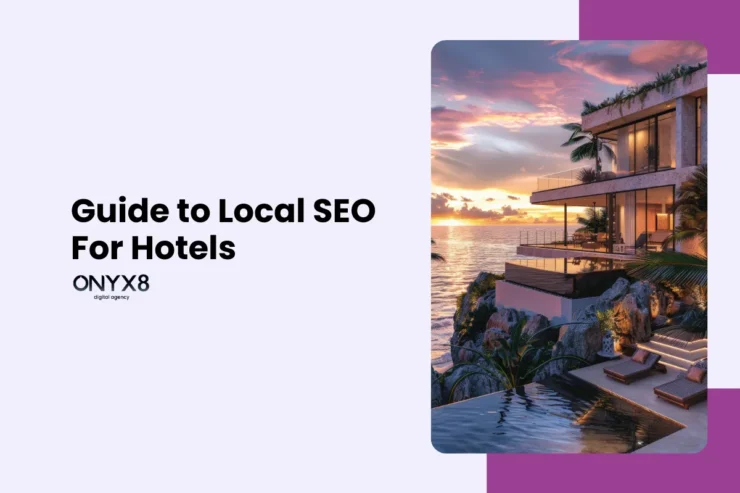Local SEO for Hotels: Comprehensive Guide for 2026
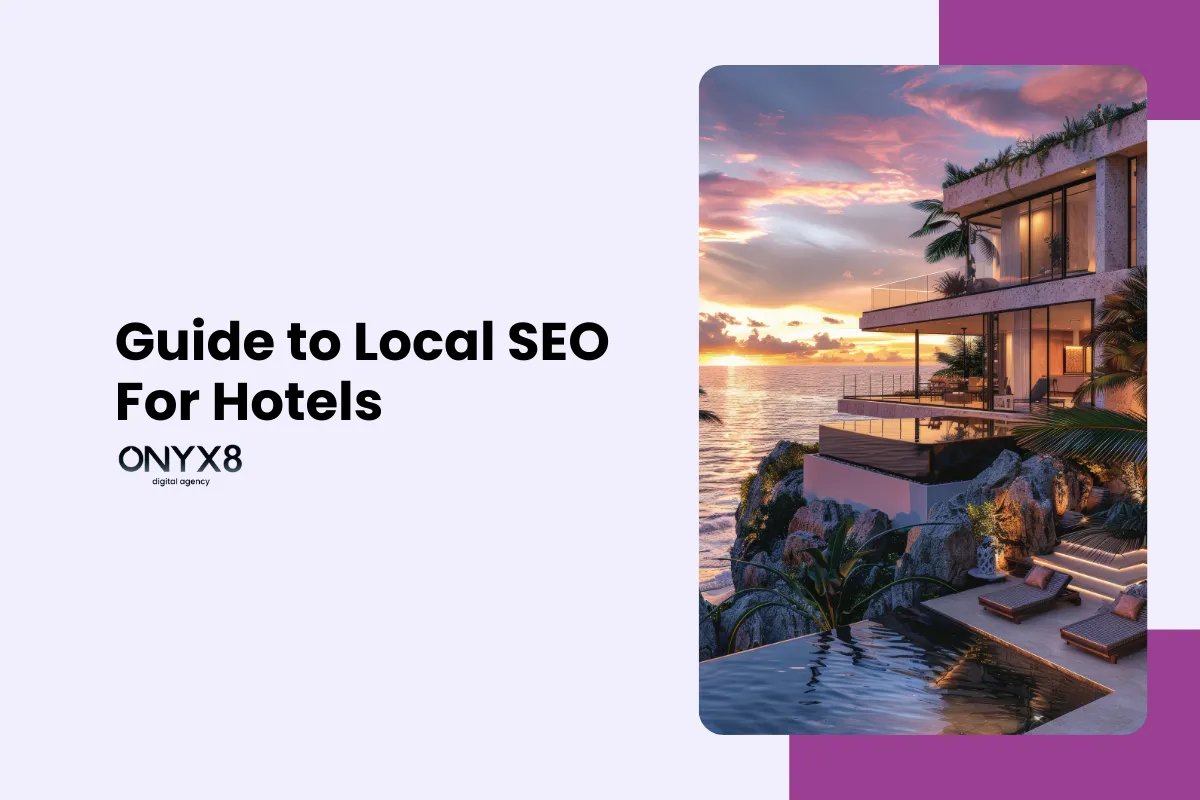
Hotels are constantly seeking new ways to attract new customers.
While online booking sites are essential, nothing beats organic visibility.
This is where local SEO comes in.
As online bookings rise, hotels must appear in local search results to capture the market.
We’ll break down the 9 of the most effective strategies to enhance organic visibility of your hotel.
This guide on “Local SEO for hotels” will help you enhance your marketing strategy.
Let’s start with why hotels need to implement local SEO.
Why local SEO matters for hotels
Local SEO helps hotels show up in searches for nearby accommodations.
Imagine, someone is planning a trip to San Francisco. They Google “best hotels in San Francisco.”
Wouldn’t you love to be the first place they see?
That’s the power of local SEO.
In fact, 60% of hotels don’t optimize for local search.
So it’s not just about looking good. It’s about filling the rooms and attracting customers.
It’s about being found when guests search for local accommodations.
When someone searches for “best hotels in San Francisco”, you want your hotel to pop up at the top of the search results.
This isn’t just about vanity – it’s about driving direct bookings and increasing revenue.
Top strategies to implement local SEO for hotels
1. Optimize Google Business profile
Your GMB profile is the first impression for many potential hotel guests. It’s your digital storefront, and it needs to shine.
A strong GMB profile can boost your local search rankings. It will also drive more foot traffic.
Google My Business is the cornerstone of local SEO. It’s not rocket science.
An optimized GMB listing can hugely boost a hotel’s visibility on Google Search and Maps.
A complete, accurate GMB profile can boost bookings and local search rankings.
What to consider:
- Ensure NAP Consistency: Make sure the NAP is the same on all online platforms. This is very important!
- High-Quality Images: Upload high-res images of the hotel and its local attractions. Include the exterior, interior, rooms, and also amenities.
- Update Regularly: Regularly update the listing with new images, special offers, and news.
- Respond to Reviews Quickly: Respond to all reviews, good or bad, to engage with guests. And respond quickly, don’t leave it there, and get back to it in a few weeks or a month.
2. Leverage local keywords
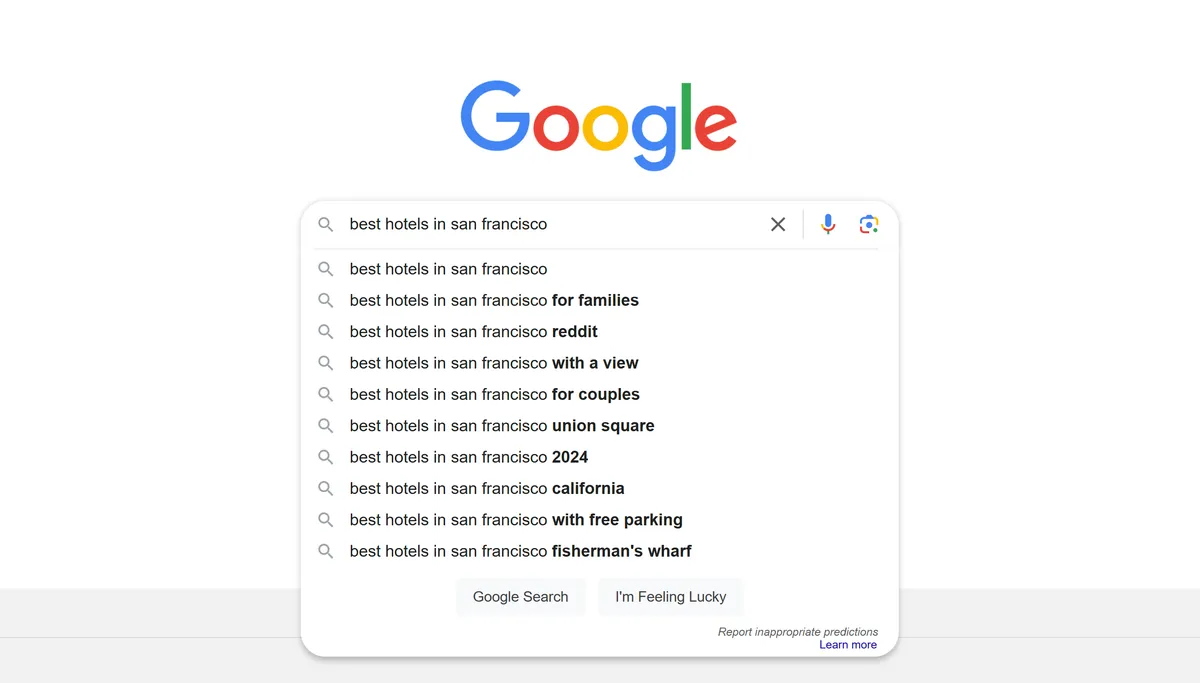
Local keywords help search engines see the hotel’s relevance to specific locations.
But, using these keywords can attract searchers looking for local hotels.
What to consider:
- Incorporate in Content: Use local keywords in blog posts, landing pages, and service descriptions.
- Optimize Metas: Include location-specific keywords in meta descriptions and title tags.
- Long-Tail Keywords: Use long-tail keywords like “boutique hotel in downtown Miami” for targeted traffic. If your hotel is in Miami, for example.
3. Optimize website for mobile
Most users book hotels on mobile devices.
So a mobile-optimized website is a must. A poor mobile experience can lead to high bounce rates and lost revenue.
Your website is your hotel’s online home. It should be inviting, informative, and easy to navigate.
A well-optimized website can boost your search rankings.
It can also improve user experience and increase direct bookings.
A mobile-friendly website and app can boost user experience. They can drive conversions and improve local search rankings.
What to consider:
- Responsive Design: Ensure the website is responsive and adapts to different screen sizes.
- Fast-Loading Speed: Optimize images and minimize code to improve loading times.
- User-Friendly Navigation: Simplify navigation menus and make booking forms easy to use.
4. Create localized content
Localized content can attract guests searching for info about a specific area.
This approach not only improves SEO but also enhances user engagement.
What to consider:
- Local Guides: Create blog posts or guides about local attractions, events, dining options, and local life.
- Hotel Events: Share news about events happening at the hotel or in the vicinity.
- Guest Stories: Share stories and testimonials from hotel guests.
5. Build local citations
Local citations are one of the purest local link-building strategies. These citations are mentions of a hotel’s name, address, and phone number on other websites.
These citations can improve a hotel’s local search engine rankings.
What to consider:
- Local Directories: List the hotel in local directories like Yelp and TripAdvisor.
- Industry-Specific Sites: List the hotel on travel and tourism websites.
- Local Chambers of Commerce: Get listed on the local chamber of commerce website.
You may also like: Top 150 Local SEO Statistics on Different Industries
6. Encourage and manage reviews
Online reviews can make or break a hotel. A strong online reputation can build trust and attract guests. It can also boost your booking rate.
Reviews play a crucial role in local SEO. Positive reviews boost a hotel’s credibility and local search ranking.
Encouraging guests to review and respond to them can build trust.
What to consider:
- Encourage Guests: Ask happy guests to review us on Google and TripAdvisor.
- Respond to Feedback: Address both positive and negative feedback professionally and promptly.
- Monitor Reviews: Use tools to track reviews on various platforms. This helps you stay on top of guest feedback.
7. Use structured data markup
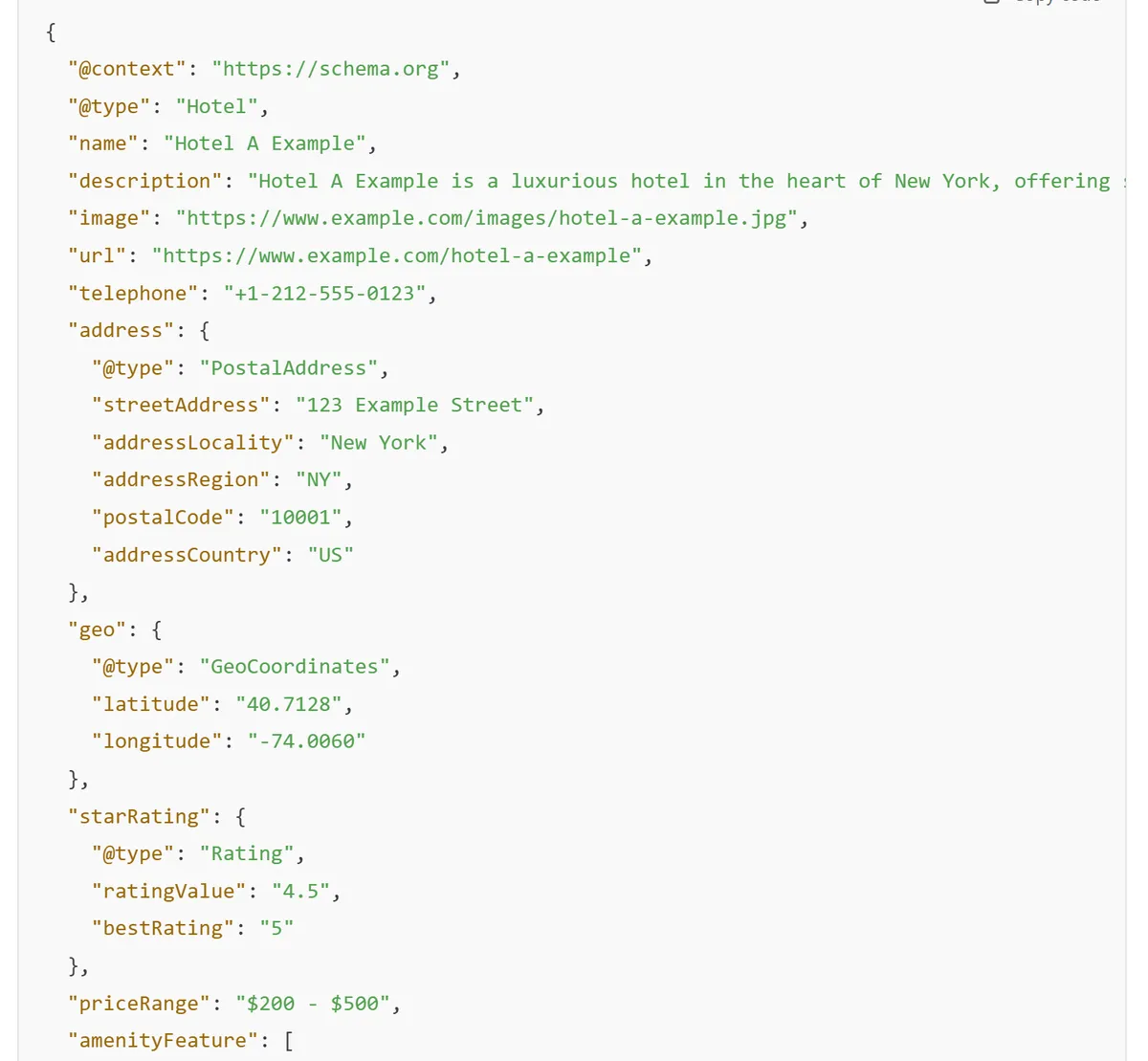
So what is structured data?
Structured data is information organized in a specific, predefined format, making it easy for search engines to search, interpret, and analyze your page content.
See a fragment of a hotel Structured Data example in the above image.
For hotels, this can mean better visibility in search results with rich snippets.
What to consider:
- Schema Markup: Use schema.org to add markup for local businesses, events, and reviews.
- Google’s Structured Data Testing Tool: Use this tool to verify the markup is correct.
8. Optimize for voice search
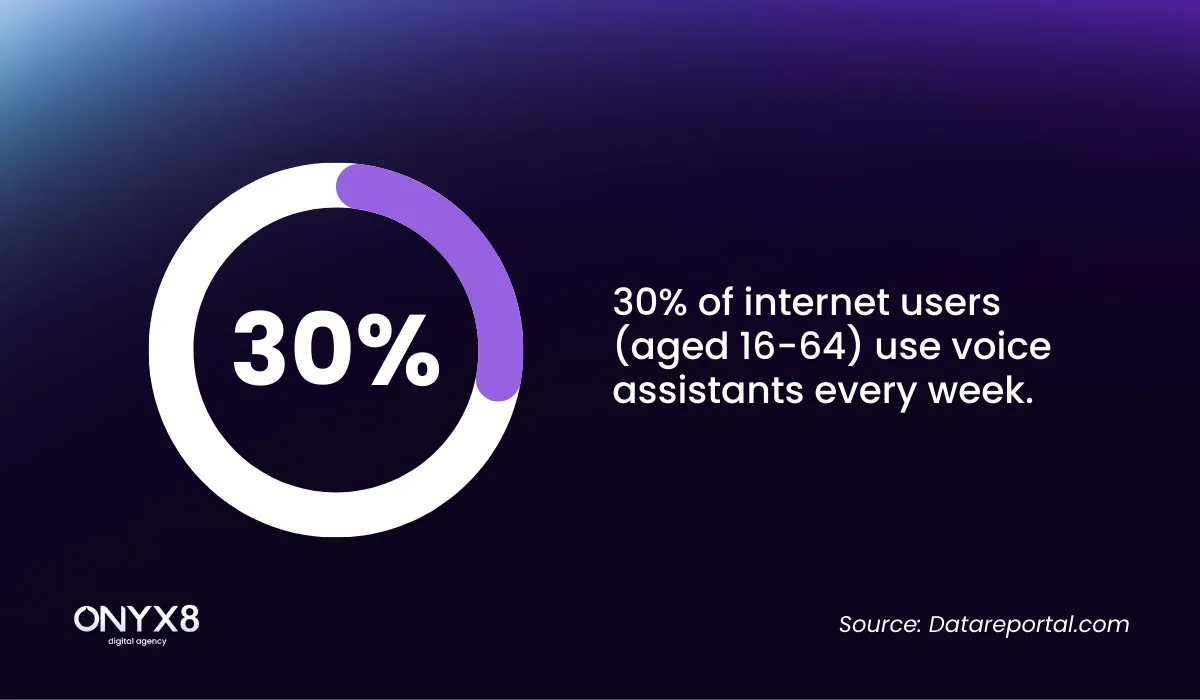
With the increasing use of voice-activated devices, optimizing for voice search is crucial.
Voice search queries are often more conversational and longer.
What to consider:
- Mobile Optimization: Make the website mobile-friendly. Many voice searches are on mobile devices. In fact, 30% of internet users (aged 16-64) use voice assistants weekly.
- Natural Language Keywords: Use natural language and question-based keywords in content.
- FAQs: Create a frequently asked questions section to capture voice search traffic.
9. Engage with social media
When implementing local SEO for your hotel, don’t forget about social media. Connect with potential guests and build brand loyalty.
A strong social media presence can boost your hotel’s visibility. It can drive traffic to your website and generate bookings.
Social media signals aren’t direct ranking factors.
But they can help local SEO. They do this by driving traffic and boosting brand awareness.
What to consider:
- Local Hashtags: Use local hashtags to increase visibility among local users.
- Geo-Tags: Use geo-tags in posts to target local audiences.
- User-Generated Content: Encourage guests to post their experiences on social media. Also, feature their content. And do NOT use AI-written content for the blog, even if it’s cheap or free. Your content must provide value!
You may also like: How Web Design Impacts Content Marketing
5 helpful tips for hotel business owners
Tip 1. Strategic Planning
Successful local SEO requires a strategic plan.
Regularly audit your SEO efforts, analyze results, and adjust your strategy as needed.
Remember, SEO is a continuous process, not a one-time task.
Tip 2. Budget Allocation
Allocate a budget for local SEO activities. This includes:
- Hiring SEO experts
- Using tools
- And running local ads. They will boost organic efforts.
Tip 3. Staff Training
Train your staff to understand the basics of local SEO. This includes:
- The importance of consistent NAP info.
- Encouraging guests to leave reviews.
- Understanding social media’s role in local SEO
Tip 4. Monitor Competitors
Keep an eye on what your competitors are doing regarding local SEO.
This can provide insights into what works and help you stay competitive.
Watch the video above for more insights.
Tip 5. Use Analytics
Use tools like Google Analytics and Google Search Console. They can monitor your website’s performance.
Check metrics like:
- Organic traffic
- Bounce rate
- Engagement rate
- And conversion rate.
These metrics show how well your local SEO is working.
How Onyx8 can help with Local SEO for hotels
The hotel industry is very competitive.
That’s why, to stay ahead, hotels should implement effective local SEO strategies.
As a professional SEO agency, Onyx8 will help you improve visibility and increase organic performance.
For your hotel project, you will get:
- Project ownership
- Full transparency
- Tangible results
Contact us or simply fill in the form below to schedule a consultation.
